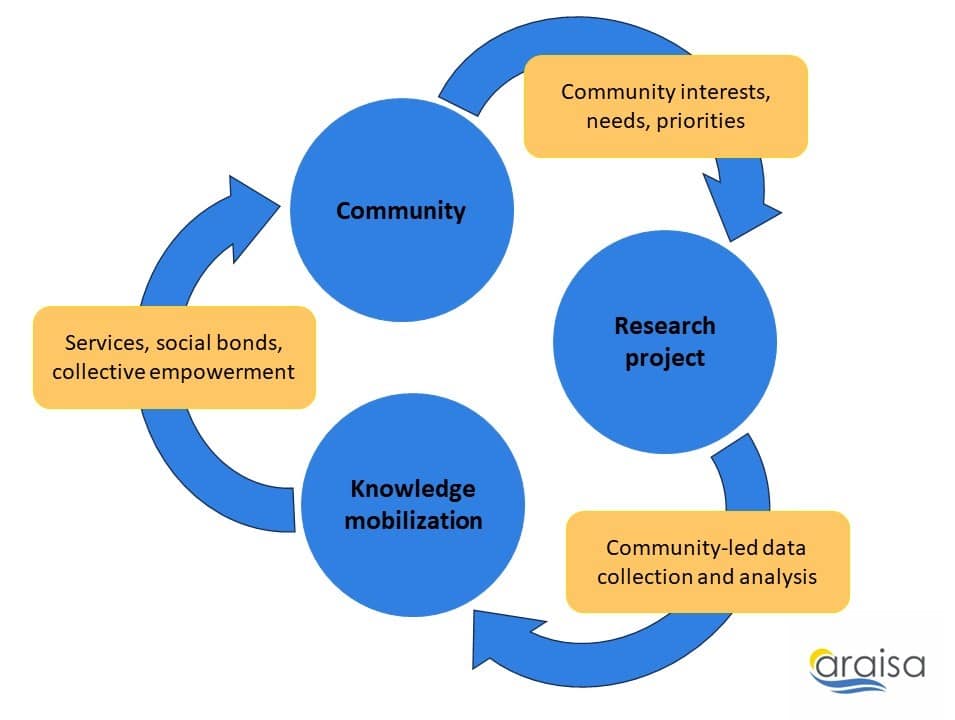Engaging Community through Research
January 9, 2024

Research can play a role not just in describing the experiences of a newcomer community but also in strengthening social bonds.
Communities are an important part of social life that shape how individuals experience the world and interact with one another. To belong to a community is to share something – identity, history, values, geographic region – with others while also sharing a sense of togetherness. While service providers deliver programming to individuals, they also work with and support communities. An organization that provides services to newcomers from a particular country, or who speak a common language, is providing community-based service. Service providers also support communities who may be less visible – for example, sexual or gender minorities, people living with disabilities, or those impacted by traumatic events. Research can play a role not just in describing the experiences of a newcomer community but also in strengthening social bonds.
Community-based research involves collaborating with a community on all aspects of a research project. In other words, it entails working with a community rather than doing research about a community. When research is guided by a community and its unique set of interests, projects can take a variety of forms and approaches. Some projects may focus on issues that have a direct impact on the community and its well-being. In this case, the community will be integral to designing the research project, collecting data, and mobilizing the findings. Other projects can seek to bolster ties within a community. These projects may begin with a loosely associated set of individuals who, through their engagement in the research process, become part of a more integrated group.
An effective project will benefit, empower, and give voice to a community of newcomers.
An effective project will benefit, empower, and give voice to a community of newcomers. For example, a service provider organization might initiate a community-based research project to support newcomers living with HIV. Newcomers impacted by HIV may not see themselves as part of a community with a shared identity, especially in places where limited services or support are available. But these newcomers nevertheless share similar experiences, interests, hopes, and fears. A service provider can initiate a project to address these needs while bringing together people who face similar challenges. A project can proceed in several stages. It might begin with a set of focus groups to identify the community’s interests, needs, and concerns. A subsequent stage may involve the development and evaluation of services or programming. This might branch out to other initiatives, such as an oral history project or community garden. A truly collaborative project will not only empower each individual but also invest the community with a stronger collective voice.
By using research to actively engage and collaborate with newcomer communities, we can begin to view knowledge creation and mobilization as a relationship-building process. Most research involves synthesizing qualitative or quantitative data to produce knowledge, which is usually presented in written reports as tables, graphs, or recommendations. Community-based research can result in similar facts and figures, but it is capable of more. When a project forges new bonds while vitalizing existing ones, enhanced relationships are an important outcome of the research process. Knowledge becomes embedded in the ties that hold a community together.
Planning a community-based project is a useful way for service providers, researchers, and newcomers to think about research. It encourages us to think about the diverse communities people belong to as well as the relationships that can emerge from the research process.
For more resources or examples of community-based research, see R-PEACE, Centre for Community Based Research, Community-Based Research Centre, or Community Based Research Training Centre.

Jason Chalmers, PhD
Research Lead / Responsable de la recherche

About the Author
Jason Chalmers
Jason Chalmers holds a PhD in Sociology from the University of Alberta and was a Postdoctoral Fellow in the School of Community and Public Affairs at Concordia University. As an interdisciplinary researcher, Jason draws on diverse methodologies and is particularly inspired by creative and community-based practice. Jason’s research interests include Canada’s immigration history, Indigenous-settler relations, and social inequality.
You can reach Jason at jchalmers@araisa.ca
